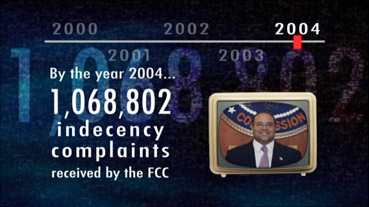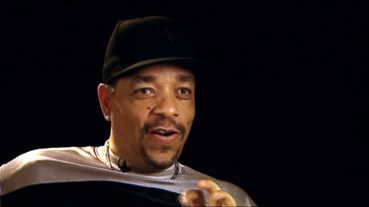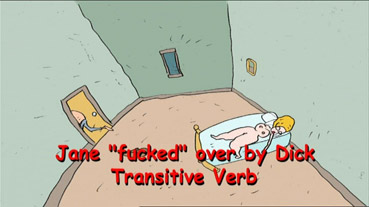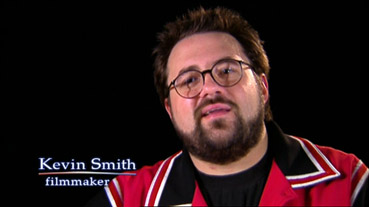Look, this is a documentary about the word of the title, and if you are offended by the use of such language then please, please, close this window or click on the back button of your browser now, as it's going to appear a lot in the following review. Okay? Good.
| "If you can't say 'fuck' then you can't say 'fuck the government!'" |
| Lenny Bruce |
Many years ago, back when he was funny and had credibility, I remember seeing Billy Connolly start a near three-hour stand-up show with a warning about the language to be used within, but with the following explanation: "A lot of people think 'fuck off' means 'go away'. It doesn't. 'Go away' means 'go away', 'fuck off' means 'FUCK OFF!'." He's right, of course. There are times when only that word will suffice, and creatively employed it's as legitimate as any other in the English language. Too often it's not, of course, and becomes instead an overused verbal accessory for the would-be tough, employed to announce to everyone within earshot, and their mates in particular, that they are well fuckin' 'ard.

It's indicative of the thoroughness of this documentary investigation into that particular word, its application and the various reactions to it, that not only is the above Connolly quote included in the film (albeit delivered with less force than the one I saw live), but so is just about every other point I'd made a quick note to include before sitting down to watch the film itself. A lot of bases are covered here, from the word's age-old use as a term for fornication through its myriad uses as a term of abuse – 'go fuck yourself' has always been a personal favourite of mine for the image it creates of the suggested act – and its appearance and widespread use in all forms of popular culture, from stand-up, movies and political gaffes, to music, cable TV (HBO in particular) and network television. I was pleased to see that the currently circulating claim that it was an acronym for Fornicate Under Command of the King is curtly dismissed as nonsense, although it does give the ever wonderful Hunter S. Thompson the chance to speculate on the horror of having to get permission from George Bush to get laid. Many of the key landmarks for the word's appearance in the media are covered, with the work of comics Lenny Bruce and George Carlin explored in appropriate detail. M*A*S*H is credited with its first appearance in a mainstream movie (in a moment that made me choke with laughter when I first saw it), while its almost scattergun incorporation into the dialogue of Deadwood is seen as a step too far by comedian Janeane Garofalo, ironically one of the word's key supporters.
I'll be up front and admit that it's a word I regularly use, though like most I tend to be selective about the company in which I do so. Does that make me a hypocrite? Possibly. But it's a fact that almost all of us tend to modify our language and delivery depending on where we are or who we are talking to in the name of social interaction and even economic survival – see how long you keep that sales job if you tell each customer to "have a nice fucking day," no matter how cheery your delivery. In my own day job, an ill-judged use of the word would likely land me in a disciplinary hearing or even see me suspended from work. As a union rep, I've more than once defended others for outbursts in which the word was used to berate a colleague. In one case, a judgement on whether it was a verbal slip or a premeditated insult hung simply on whether it was said once or twice, while in another we argued that it was fully justified because the victim really did need to be told to fuck off. Believe it or not, we won that one.

As is the way with modern Western culture, the views of celebrities are sought as well as those of linguists and other expert witnesses, though at least they've been purposefully selected. The stand-up comedy fraternity is particularly well represented, while the word's use in television drama is left to producers Steven Bochco and David Milch to defend, something Milch initially does with some venom. Amongst those representing the music industry are Alanis Morrissette and actor/rapper Ice T, and for me it's he who most accurately nails the real appeal of the word, and he who identifies the one occasion that absolutely no other type of language can possibly suffice – I'll leave you to discover that one for yourself.
A degree of balance is provided by the likes of "Concerned Women for America" representative Jan LaRue, conservative statesman Alan Keyes and singer Pat Boone, to name but three. Although intermittently mocked by the editing – extracts from interviews with the alternative camp are dropped in mid-sentence to play like direct responses to statements made, which they weren't, of course – all three still have their moments. LaRue, in her condemnation of the proliferation of online pornography, suggests that sex is a lot more fun to do than to watch, Alan Keyes manages to sound surprisingly reasonable on a range of points, and Pat Boone reveals that he uses his own surname as an inoffensive curse word, something Ice T later runs with and renders amusingly filthy. It's in the context and situation of the word's usage that the real disagreement lies, something that many on both sides either choose to ignore or are given little chance to discuss, with members of the pro camp appearing to advocate its usage anytime and anywhere, while the opposition regard its slow creep into everyday language as akin to a swine flu pandemic.
Inevitably, the pro-fuck camp appear to win the day, but given the film's title is Fuck and not F*ck or The F Word, I shouldn't think too many will be surprised. Whether it really is a free speech issue will be in the politics of the beholder and few of the interviewees are prepared to narrow it down to a simple yes or no. Connolly enthusiastically celebrates the word and Kevin Smith reveals that he openly swears in front of his young daughter, though notes she has chosen not to use this language herself, at least within his earshot. Perhaps the most interesting response comes from Deadwood creator David Milch, who when asked if he'd feel comfortable using the word on network TV states that he has no problem with the idea, but quickly adds that he wouldn't want his children watching it.

Although largely interview driven – and there are many, many more interviewees from both sides of the argument than those named here – things are kept moving at an unwaveringly brisk pace, with vox-pop chats with the public, songs in which the word features prominently, and notable historical quotes (some of which are taken out of context). We're also treated to a number of pertinent and well chosen film and TV extracts, including a snippet from a version of Shaun of the Dead that's been 'cleaned up' for network TV and airplane screenings. Particularly engaging are the animated links and sequences provided by the great Bill Plympton – which include a game show-style lesson on the semantics of the word's usage – and diversions are taken to explore the finger flip gesture and the ludicrous outrage surrounding Janet Jackson's notorious Superbowl nipple exposure. Almost no opportunity is missed to get the title word on screen, even to the extent of padding out the sectional titles ("Breaking Fucking News," "Fuck Hollywood," etc.) and at the end we are informed it has been used 629 times in this very film, a figure quoted largely to illustrate how much it would cost the filmmakers should a proposed bill to impose per-word fines on cable and satellite broadcasters be passed.
It would be easy to form a dismissive pre-viewing opinion of a film whose title alone seems designed to court controversy and is going to cause problems for the distributor looking to get copies on the shelves at Tesco, but Fuck is a detailed, soundly researched and well assembled documentary whose exploration of this one word opens the door to discussion on a whole variety of issues around media, society, politics, tolerance, and yes, free speech. The sheer range of interviews, material and topics covered make for a densely packed 95 minutes, and although the filmmakers may have subtly aligned themselves with one viewpoint over the other, it's to their credit that they give voice to both sides without overly mocking the opposition. I enjoyed it a great deal, but would I watch it with my mother? Not fucking likely.
A crisp anamorphic 1.78:1 transfer whose strongest elements are the interviews, whose dark backgrounds also serve to show off the solid black levels. The archive material inevitably varies in quality depending on the source material, and 4:3 stuff has been cropped (or in one case stretched) to fit.

The soundtrack is Dolby 2.0 stereo and does the job well enough, with the dialogue and music both as clear and well mixed as you'd expect for a recent production.
Fuck all. Sorry, couldn't resist that.
If you have an aversion to strong language then you probably gave up on this review in the first paragraph, but its usage in life and media is nowhere near as clear cut as few of the participants here seem to be suggesting, something that does get explored in reasonable detail in this comprehensive and entertaining documentary. You may have to selective who you watch it with, but if you think you're up to coping with a film in which the title word appears over six hundred times, then Fuck delivers the goods.
|